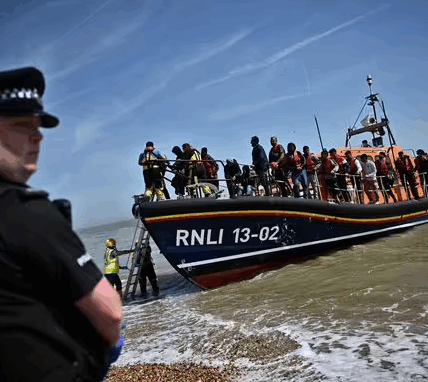Emily Spurrell said the flag-flying campaign that spread across England this year was making people feel “unsafe and afraid to walk down the street”.

England flags appeared across the country this summer (Image: Getty)
The mass flying of Union and St George’s flags across England this year marked a “disturbing” trend of hate-fuelled division, a policing leader has said. Emily Spurrell, chairwoman of the Association of Police and Crime Commissioners (APCC), said the installations, erected around the country as part of Operation Raise the Colours, had “sowed fear” and “sparked division” in communities. In a speech at a national police chiefs and crime commissioners conference, Ms Spurrell said the campaign, previously derided by others as racist and xenophobic, was aimed at provoking “intimidation”.
Some local authorities removed the flags from public infrastructure after the campaign took hold in the wake of asylum hotel protests, sparking major debate over whether they were a simple demonstration of patriotism or something more insidious. “Flags are an expression of our identity and proudly fly outside our police buildings,” Ms Spurrell said. “But when they are used to provoke fear or assert dominance, they become tools of division. That is not free expression – that is intimidation.”

Emily Spurrell warned that the flag-flying campaign had left communities ‘afraid’ (Image: Liverpool Echo)
“These actions are sowing fear, fuelling division and leaving our neighbours our colleagues and our friends feeling unsafe in their homes and afraid to walk down the street,” she added.
“These actions do not reflect the values of our country – compassion, fairness and respect are the values that bind us together.”
The Labour Government sought to ease tensions over the flag-flying campaign by claiming to be “very encouraging” of the patrioic move but warning that the Union and St George’s symbols risk being devalued when flown “purely for divisive purposes”.

Critics including Tory leader Kemi Badenoch criticised the “politicisation” of the movement, however. Ms Badenoch wrote in the Daily Mail earlier this year that it was “encouraging to see English flags flown proudly as symbols of unity, nationhood and optimism”.
“Suppressing the English flag does not stop division. It fuels it,” she continued. “If more councils embraced our shared national identity instead of fearing it, we would not be in a position where flying our own flag is seen as an act of rebellion.”
During her speech at the conference in Westminster, Ms Spurrell also criticised Home Secretary Shabana Mahmood’s new hardline approach on migration, warning that tackling the crisis “must not come at the cost of compassion”.
Ms Mahmood’s plans include cutting the time refugees are initially allowed to stay in the UK from five years to a 30-month “core protection” period which can only be renewed if it is not safe for them to return home and requiring them to spend 20 years in the UK before applying for settled status.
“We all know our asylum system is struggling. It is slow, under-resourced and in desperate need of reform,” Ms Spurrell said. “We’ve heard this week some of the plans the Home Secretary has to overhaul the system. Change must not come at the cost of compassion. We must never forget that behind every asylum claim is a human being, often in fear for their life.”